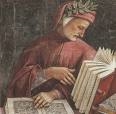 |
| Dante Alighieri (Societa Dante Alighieri) |
Dante Alighieri was a poet and politician in Florence, Italy, during the 13th and 14th century. His inspiration for most of his works was a noblewoman named Beatrice. While they only met twice in Dante's life, he considered her the base of all beauty.
Dante's greatest accomplishment is his poem "The Divine Comedy." It is a three part poem recounting his fictional journey through Hell, Purgatory, and Heaven. Dante took great care in personifying the sins and virtues found in the Christian religion. For example, in Gluttony, the Third Circle of Hell, gluttons are punished by being eternally trapped in a river of muck and filth (this can be described in a multitude of ways, such as mud and slime, or even human waste) and a storm of rain, snow, and hail pouring down on them. This symbolizes the way gluttons treat their bodies, eating and eating for no need other than enjoyment, making the body suffer the continuous stream of food.
Dante spent the first of his life in his home city of Florence, where he was educated, and in adulthood became a member of the city council. An important event in Dante's life occurred in January of 1302. It was during this time that the political party opposing Dante's party took control of Florence. After accusing Dante with false charges, they exiled him from the city under threat of execution. He never saw his home again. After his exile, he spent the rest of his life wandering Italy. He died on September 14,1321 in Ravenna, Italy, at the age of 56.
Dante believed that all people should be treated equally and given the same chance. He believed that every man has the same opportunity that one man has, if he is willing to pursue it. This belief is originally found in the actual Christian religion, which believes in the equality of all men. This idea is reinforced further by the following excerpt from an article on Dante in the Catholic Encyclopedia: "...the moral or allegorical meaning that Dante wishes to keep in mind is that God will do for all what he has done for one, if all are willing to make this journey" (Gardner).
Dante understood the human condition enough to be able to personify our sins and virtues, thereby breaking down the barriers that surrounded the Christian religion and putting it in a different perspective. Many can see the effects of his writing today: “… it is noteworthy today that many serious non-Catholic students of life and letters owe a totally different conception of the Catholic religion to the study of the 'Divina Commedia'. The power of the sacred poem in popularizing Catholic theology and Catholic philosophy, and rendering it acceptable, or at least intelligible to non-Catholics, is at the present day almost incalculable” (Answers.com). Dante is known as one of the forerunners for adapting a religion that believed in a being that created all and whose virtues were peace and humility, into a story of one man’s journey to find redemption by seeing those virtues personified, along with the consequences of living without those virtues. Dante has even been compared to other famous poets: “But over this entire vast field his dramatic sense played at will, picturing human nature in its essentials, laying bare the secrets of the hearts with a hand as sure as that of Shakespeare” (Gardner).
Dante inspires many because of his feelings toward his exile and the actions he took against them. “In October 1301, Dante was sent in a delegation from the commune to Pope Boniface VIII, whose policies he openly opposed as constituting a threat to Florentine independence. During his absence the Blacks (an opposing political party) gained control of Florence. In the resulting banishment of the Whites (the party which Dante was associated with), Dante was sentenced to exile on January, 1302.” (Gardner). The effects of Dante’s exile had a great effect on Dante’s writing. In the Inferno, Dante includes Pope Boniface VIII (the one who orchestrated the Blacks uprising in Florence), in Fraud, the Eighth Circle of Hell, for his misuse of power as the Pope, a great crime in Christianity. It is a well known fact that Dante did much to oppose his exile. Shortly after his exile, Dante joined with some of his former party members to form a group intent on changing that sentence. However, after seeing their disorganization, he left. Throughout the years, he was given offers to return to Florence if he would admit the false charges placed against him. He always refused. In fact, he once sent the Florentine council a series of letters cursing and insulting them for their deeds. This in turn, caused them to extend his exile to his two sons. Yet he still persevered and did not give in to their demands of repentance. And his perseverance has been rewarded, for in 2008 the Florentine city council ended his exile, in honor of his works.
Dante is a hero because he saw humanity's evils and, instead of ignoring them, he dove straight into their heart and personified them because he knew that only by seeing sin itself could he truly understand the beauty of life.
Page created on 2/13/2010 12:00:00 AM
Last edited 2/13/2010 12:00:00 AM
